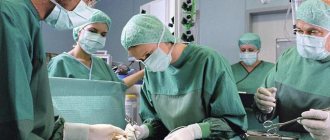Certificate of incapacity for work after surgery for excision of hemorrhoids
The length of time a patient spends in the hospital after hemorrhoid removal depends on many factors. First of all, the type of operation is taken into account - planned or emergency, the presence or absence of complications. This indicator is influenced by the degree of hemorrhoids at the time of surgery and the characteristics of recovery.
How long does the rehabilitation period last?
An important role in this is played by the individual properties of the patient’s body, which characterize his ability to recover: age, physical fitness, the presence of concomitant chronic diseases and complications.
Excision of hemorrhoids is not a complex intervention; as a rule, the patient stays in a hospital for no more than 3–5 days. And only if complications arise—external or internal bleeding from damaged vessels, suppuration of postoperative wounds and sutures—the number of days for hospital stay increases significantly. This condition requires constant medical monitoring, dressings and antibiotic therapy.
After an operation for excision of hemorrhoids, the sick leave is extended by the proctologist at the place of residence in the clinic. In his absence, a surgeon or therapist. In general, the length of stay for outpatient treatment is about 10 days. However, its duration may vary depending on the patient's recovery rate. The nature of the patient’s work is also taken into account.
A doctor can give sick leave for up to 14 days if work activity involves:
- hard physical labor;
- lifting loads;
- staying on your feet for a long time.
Even if a person feels satisfactory, some types of work may be contraindicated for him.
If complications arise and there is no positive trend in the patient’s health, only a special commission has the right to issue a certificate of incapacity for work in the future. If a positive decision is made in favor of the patient, outpatient treatment and recovery after surgery can be extended by 21 days. In some cases, this period is increased to 1 month.
//www.youtube.com/embed/y-2YAQkdoiI?wmode=transparent&iv_load_policy=3&modestbranding=1&rel=0&autohide=1&v=y-2YAQkdoiI&autoplay=0
x
The sick leave must be submitted to the human resources department at the place of official employment. It is advisable to do this immediately after returning to work. This document officially substantiates the reasons for your absence from work. Timely submission of sick leave guarantees quick payments due to loss of ability to work.
Author: Andrey Ivanovich Vasiliev
Rate this article:
85
Thank you for your feedback
Cost of surgery to remove hemorrhoids
Like any other surgical intervention, the cost of surgery to remove hemorrhoids depends on the chosen technique and the status of the clinic where the person went. Hemorrhagic nodes can be removed free of charge by contacting a medical institution at your place of residence, but you will not have to choose a method for removing the cones. Only paid clinics give a person the right to choose a treatment method, and each of them has an excellent price. The table below shows how much surgery to remove hemorrhoids with a laser and other methods of treating the disease cost in Moscow.
| Type of procedure | Price |
| Desarterization | 20 thousand rubles |
| Sclerotherapy | 3 thousand rubles |
| Morgan-Milligan hemorrhoidectomy | 3-7 thousand rubles |
| Ligation | 5 thousand rubles |
| Electrocoagulation | 2-9 thousand |
| Laser removal | 1-10 thousand |
How many days do you have sick leave after hemorrhoid surgery?
The duration of temporary disability after surgical treatment of hemorrhoids also depends on a number of factors, namely:
- type of operation;
- stage and severity of the disease;
- presence of postoperative complications;
- type of work activity of the patient.
Temporary disability after minimally invasive surgical interventions
Minimally invasive surgeries have a number of advantages, including:
- speed of operation;
- low-injury;
- painlessness;
- carried out on an outpatient basis;
- short recovery period (up to three days);
- low risk of complications.
Considering these advantages, we can say that recovery after minimally invasive surgical treatment is easy and quick. In most cases, sick leave is issued for only one day (the day of surgery), and the patient can start working the next day. Sometimes, if the patient’s work activity involves lifting weights or other types of heavy physical labor, a certificate of incapacity for work may be issued for 2-3 days.
Temporary disability after extensive surgery for hemorrhoids
Hemorrhoidectomy is a surgical procedure during which hemorrhoids and part of the rectal canal mucosa are removed. This operation is the only effective method for treating advanced forms of hemorrhoids.
This type of surgical treatment of hemorrhoids also has a serious drawback - a long and difficult recovery period, during which the patient is unable to work. Therefore, a sick leave certificate is issued for the entire period of the patient’s stay in the hospital, as well as for 15 days of outpatient treatment.
A certificate of incapacity for work for the period of inpatient treatment is issued by the hospital where the patient was operated on. The duration of inpatient treatment takes on average 7-10 days.
After discharge from the surgical department, the sick leave is extended by a proctologist, who will see the patient on an outpatient basis. At the end of this period, the patient undergoes a follow-up examination; if the recovery is successful, there are no complaints or complications, then the sick leave is closed and the patient must begin work the next day.
If after 15 days of outpatient treatment the patient has any complaints and complications that require correction have developed, then the medical advisory commission decides on extending the sick leave until the patient fully recovers - for a maximum of 10 months. But the patient must visit the treating doctor and a medical commission every 15 days for an examination, based on the results of which the sick leave will be extended or closed.
Thus, with a successful operation and with an uncomplicated postoperative period, sick leave is issued for the entire stay in the surgical department and 15 days of outpatient treatment. In case of a complex operation, difficult recovery or referral to sanatorium treatment, a certificate of incapacity for work is issued for a maximum of 24 days.
Sick leave after surgery
Surgery on a hemorrhoid is a serious operation, after which a person needs time to recover. According to the current legislation of the Russian Federation, after removal of hemorrhoids, the patient is required to issue a sick leave certificate immediately after discharge from the medical institution.
After discharge, the doctor is obliged to tell further steps for prevention and treatment.
How many days? Sick leave can be increased for up to 10 days after the patient is discharged from the medical institution. In this case, the entire non-work period is calculated from the moment the patient is treated in a hospital, plus 10 days for home treatment. A ballot may be issued for a longer period. So the attending physician can issue a document for 20 or 30 days, depending on the severity of the disease.
If the patient's condition does not improve, an extension of sick leave is considered. This decision is made by a medical commission. According to the law, she has the right to extend her recovery period for up to 10 months. If this decision is approved and the patient is given sick leave, he undertakes to visit a medical facility at least every two weeks. This is necessary for full monitoring of the course of the disease by the attending physician.
After undergoing a major operation, or the occurrence of complications, the patient may be given a referral for treatment in a sanatorium. In this case, the sick leave is extended. In this case, the total period should be no more than 24 calendar days.
Is it possible to cure hemorrhoids without interrupting work? In fact, there are a large number of ways to treat a dangerous disease within 24 hours. In this case, the patient will not need to change his work rhythm and daily routine. Treatment takes place without hospitalization.
This type of treatment benefits everyone. And to hospitals, and employers, and the patients themselves. Medical institutions can allocate budgets more efficiently and treat more people. Employers do not lose employees on sick leave. Patients themselves earn more money without being in outpatient or inpatient treatment.
Is sick leave given for hemorrhoids in what cases and for how many days?
The development of pathology may have distinctive signs and properties. There are several clinical situations that are the basis for issuing a certificate of incapacity for work:
- Relapse (exacerbation) of pathology, which is characterized by a sharp deterioration in a person’s condition and temporary loss of ability to work.
- The progressive course of the disease is stage 3-4, accompanied by a significant increase in hemorrhoids and their loss.
- The development of complications, which include bleeding, a pronounced inflammatory reaction, infection, a purulent process with the formation of a limited cavity in the soft tissues (abscess), anal fissure, spontaneous formation of blood clots in the nodes.
Treatment is carried out in a hospital and at home. For the duration of therapeutic measures, a document of incapacity for work is issued, which is an official document confirming a good reason for a person’s absence from the workplace. The duration of issuance depends on several criteria:
- The severity of the pathological process or inflammatory reaction.
- Place of treatment - usually in a medical hospital, a longer period is required to perform therapeutic measures, which is reflected in the document of incapacity for work.
- Direction of therapeutic measures - in the case of surgical intervention for the purpose of radical treatment of the disease, a longer period is required to carry out preparatory measures. They include the prescription of medications, surgical procedures, and the postoperative period (the time required for the healing of the postoperative wound).
On average, people with hemorrhoids are given sick leave for 10-14 days for treatment. It can increase over a longer period. The possibility of extension in this case is determined by a medical commission, which includes the head of the department and the chief physician of the medical institution.
Sick leave for hemorrhoids during exacerbation
To get sick leave, you need to go to the nearest clinic to the appropriate specialist. The following doctors are involved in the treatment of hemorrhoids and, accordingly, the issuance of sick leave:
- proctologist;
- coloproctologist.
In district clinics where there is no proctologist or coloproctologist on staff, their functions are performed by a surgeon.
You should contact a specialist at the first symptoms of hemorrhoids, since sick leave cannot be issued retroactively.
Which specialist should I contact?
A proctologist or coloproctologist will help you cope with this scourge. To undergo treatment under compulsory medical insurance, you can make an appointment at the reception of the clinic to which you are assigned under the policy, or on the Internet if a self-registration center operates in your region.
If there is no doctor of this specialty in the medical institution, you should contact a surgeon. You may need to first visit your local GP or GP. By telling him about your symptoms, you will receive a referral to the right specialist.
You can also resort to paid medicine
Please note that not all private medical centers have the right to issue sick leave; when choosing a clinic, clarify this issue with the administrator. In addition, to get sick leave in a paid clinic, you will need to take all kinds of tests and undergo examinations
Attention! Before the examination, it is necessary to carry out a cleansing procedure using an enema. It’s easier to purchase Microlax at a pharmacy and follow the instructions.
If the pain is very severe, it is not necessary to give an enema. In this case, you should try to empty your bowels naturally several hours before your appointment.
Features of the disease
- Stage 1
- Causes of the disease
- With radical surgery
Hemorrhoids are a disease that affects people of different ages and professions, but people who are most susceptible to it are those who spend the working day in a sedentary position or whose activities involve heavy physical exertion, which can subsequently cause aggravation.
Hemorrhoids occur in various forms: external, internal and combined. It should be remembered that external hemorrhoids are not an advanced stage of the internal form of the disease.
The cause of hemorrhoids in any form of the disease is primarily the congenital weakness of the venous walls. Some provoking factors contribute to the development and exacerbation of the disease, such as:
- sedentary lifestyle;
- unhealthy diet (abuse of fatty, fried, salty, spicy foods, low amount of plant fiber);
- problems with stool – constipation or prolonged diarrhea;
- bad habits (alcohol, smoking);
- regular hard physical work;
- strength sports;
- pregnancy, childbirth.
Any of these factors can cause a rush of blood to the pelvic organs and congestion in this area, which leads to dilation of hemorrhoidal veins and the formation of nodes.
In the external form of hemorrhoids, nodes are formed due to protrusion of the walls of the subcutaneous vessels localized around the sphincter. The plexuses grouped near the anus can be of different shapes and sizes. During the period of remission they are painless. During an exacerbation, the hemorrhoidal plexuses become inflamed and increase in size, causing a feeling of discomfort, sharp pain and itching in the anal area. Minor bleeding may occur during bowel movements.
The internal form of hemorrhoids is characterized by the localization of hemorrhoids in the rectum. There are four stages of severity of hemorrhoidal disease, which are characterized by the size of the nodes and the severity of symptoms.
- At the first stage, the nodes are small and do not cause the patient any discomfort.
- The second stage is characterized by enlargement of the nodes and their bleeding. The nodes may fall out during bowel movements and then return to the rectum on their own.
- At the third stage, hemorrhoids fall out during defecation or any heavy physical activity and cannot be reset on their own.
- At the fourth stage, the nodes may fall out even with slight tension or constantly hang out of the anus. This is the most advanced stage of hemorrhoids. The patient has persistent severe pain. There may be heavy bleeding after bowel movements.
The internal form of hemorrhoids is very difficult to diagnose independently; during the period of remission, hemorrhoids can only be detected by instrumental methods or by digital examination. The only symptom that may give rise to suspicion of internal hemorrhoids is bleeding after bowel movements.
At the first stage of hemorrhoids, it is not necessary to take out a document of incapacity for work, if the work does not involve heavy physical labor, which can adversely affect the patient’s condition. In case of exacerbation of hemorrhoids, a sick leave certificate must be issued to the patient, however, he is recommended to be transferred to an easier job.
In the second and third stages of hemorrhoids, the patient requires long-term drug treatment and bed rest, therefore, after examination by a doctor, a sick leave certificate is issued, the period of which is usually 7 days.
Stage four usually requires surgery. After the operation, the patient must be given a sick leave certificate for the entire period spent in the hospital, and the time required for rehabilitation at home - at least 10 days.
Causes and symptoms
Hemorrhoids are varicose veins of the rectum. Nodes are formed. They can fall out, causing pain and discomfort. There are three forms: internal, external and combined.
With hemorrhoids, a person tries to cope with the disease on his own, embarrassed to go to a specialist. Only the extreme stage of the disease and unbearable pain force the patient to visit a doctor. At this time, the disease is gaining momentum. Conservative treatment is becoming increasingly difficult to apply.
Symptoms and signs of hemorrhoids are:
- Unpleasant sensations in the anal area.
- Various degrees of blood loss are observed. Vessels in the anus burst.
- Hemorrhoids come out.
- Stool instability. Constipation.
- There are various discharges, in addition to feces, from the anus.
The internal form of hemorrhoids is often not detected symptomatically until the size of the nodes becomes large and they appear externally.
The disease is characterized by four stages:
- At the first stage of hemorrhoid development, the nodular formations are located internally. They are small in size. Symptoms are absent or appear extremely rarely. In rare cases, a person may experience discomfort. Suppositories and ointments help.
- The second stage is characterized by an increase in the size of the formations. Bleeding is noted. The intensity varies. The nodes may fall out but return to the rectal area on their own. The feeling of severe discomfort increases.
- Third stage. There is a lack of ability of hemorrhoids to return back. The intensity of pain and bleeding increases.
- The fourth stage represents the presence of nodes on the outside. Bleeding is high. The pain intensity is high. The patient notes pain not only during vigorous activity, but also in a static position. Inpatient treatment is indicated. Surgery to remove hemorrhoids.
The first and second stages bring discomfort to the person. They have no influence on activities. The second stage is characterized by long-term conservative therapy. In the last two stages, surgery may be indicated. At the first and the beginning of the second, the doctor has the right to refuse to issue a sheet.
The lack of competent and timely treatment causes complications of the disease in the form of thrombosis of nodes, anemia and bleeding. Pathology may develop. A person has a dilemma: under what conditions can sick leave be issued for hemorrhoids?
When is a certificate of incapacity issued?
The patient's condition largely depends on the stage of the disease. When the first signs of the disease appear, sick leave for hemorrhoids is not issued, since work capacity is not impaired. Treatment in this case is prescribed without interruption from work.
With significant progression of the disease, especially at stages 3 and 4 of the disease, the patient requires an integrated approach, which includes not only taking medications, but also strict bed rest.
After all, prolapsed hemorrhoids, their pinching and rectal bleeding are accompanied not only by severe pain, but also by significant impairment of performance. Even if his professional activity does not involve physical labor, a person cannot move normally and make basic movements. In this case, the patient with hemorrhoids should receive the prescribed medications at home.
How to recognize an exacerbation of hemorrhoids
A person whose hemorrhoidal lump is inflamed will know about it immediately.
Main features:
- severe pain, which sometimes makes it impossible to walk and sit normally, is the main sign of exacerbation of hemorrhoids;
- bleeding may occur, which sometimes becomes very heavy;
- sensation of a new growth in the anal area (bump);
- this lump can be very painful, cause a burning sensation and itching;
- Often the pain radiates to the groin or affects the perineum.
Sometimes the sensations become simply unbearable and impossible to endure. Therefore, it is necessary to use special emergency medicines.
Considering all the symptoms that are associated with an exacerbation of the disease, there should be no question as to whether sick leave is given for hemorrhoids. This even needs to be done in order to undergo full treatment and get rid of the problem before it becomes chronic.
Features of the disease
Hemorrhoids are a disease that affects people of different ages and professions, but people who are most susceptible to it are those who spend the working day in a sedentary position or whose activities involve heavy physical exertion, which can subsequently cause aggravation.
Hemorrhoids occur in various forms: external, internal and combined. It should be remembered that external hemorrhoids are not an advanced stage of the internal form of the disease.
The cause of hemorrhoids in any form of the disease is primarily the congenital weakness of the venous walls. Some provoking factors contribute to the development and exacerbation of the disease, such as:
- sedentary lifestyle;
- unhealthy diet (abuse of fatty, fried, salty, spicy foods, low amount of plant fiber);
- problems with stool – constipation or prolonged diarrhea;
- bad habits (alcohol, smoking);
- regular hard physical work;
- strength sports;
- pregnancy, childbirth.
A sedentary lifestyle contributes to the exacerbation of hemorrhoids.
Exacerbation of hemorrhoids is caused by poor nutrition.
Bad habits contribute to the exacerbation of hemorrhoids.
Heavy physical work contributes to the exacerbation of hemorrhoids.
Exacerbation of hemorrhoids is facilitated by strength sports.
Any of these factors can cause a rush of blood to the pelvic organs and congestion in this area, which leads to dilation of hemorrhoidal veins and the formation of nodes.
In the external form of hemorrhoids, nodes are formed due to protrusion of the walls of the subcutaneous vessels localized around the sphincter. The plexuses grouped near the anus can be of different shapes and sizes. During the period of remission they are painless. During an exacerbation, the hemorrhoidal plexuses become inflamed and increase in size, causing a feeling of discomfort, sharp pain and itching in the anal area. Minor bleeding may occur during bowel movements.
The internal form of hemorrhoids is characterized by the localization of hemorrhoids in the rectum. There are four stages of severity of hemorrhoidal disease, which are characterized by the size of the nodes and the severity of symptoms.
- At the first stage, the nodes are small and do not cause the patient any discomfort.
- The second stage is characterized by enlargement of the nodes and their bleeding. The nodes may fall out during bowel movements and then return to the rectum on their own.
- At the third stage, hemorrhoids fall out during defecation or any heavy physical activity and cannot be reset on their own.
- At the fourth stage, the nodes may fall out even with slight tension or constantly hang out of the anus. This is the most advanced stage of hemorrhoids. The patient has persistent severe pain. There may be heavy bleeding after bowel movements.
The internal form of hemorrhoids is very difficult to diagnose on your own.
The internal form of hemorrhoids is very difficult to diagnose independently; during the period of remission, hemorrhoids can only be detected by instrumental methods or by digital examination. The only symptom that may give rise to suspicion of internal hemorrhoids is.
At the first stage of hemorrhoids, it is not necessary to take out a document of incapacity for work, if the work does not involve heavy physical labor, which can adversely affect the patient’s condition. In case of exacerbation of hemorrhoids, a sick leave certificate must be issued to the patient, however, he is recommended to be transferred to an easier job.
In the second and third stages of hemorrhoids, the patient requires long-term drug treatment and bed rest, therefore, after examination by a doctor, a sick leave certificate is issued, the period of which is usually 7 days.
Stage four usually requires surgery. After the operation, the patient must be given a sick leave certificate for the entire period spent in the hospital, and the time required for rehabilitation at home - at least 10 days.
The earlier treatment is started, the shorter the duration of exacerbation of hemorrhoids.
Development of acute hemorrhoids
Hemorrhoids can be cured in the initial stages without much difficulty. But most people do not dare to consult a doctor in time, as a result of which the disease enters a more complex stage of development.
During the period of exacerbation of the disease, for effective treatment, the patient is issued a sick leave.
There are three degrees of severity of complications of the disease.
- In the initial stage, blood accumulates in hemorrhoids and blood clots form, but no inflammatory process is observed. The nodes are small in size, with moderate pain. The patient complains of burning and itching in the anal area, which intensifies after defecation. Soreness, redness and swelling of the perianal area intensify after ingesting spicy and salty foods and alcohol.
- The next stage in the development of complications is thrombosis of the nodes and the onset of the inflammatory process. In this case, the area around the sphincter thickens and swells. Due to the strong spasm of the sphincter, patients try to delay the moment of emptying as much as possible. Pronounced pain does not allow instrumental examination of the patient.
- A severe complication is thrombosis of hemorrhoids with inflammation of the entire anal area. Stagnant blood thickens, a blood clot forms inside the node, compressing its nerve endings. The patient is in severe pain. Due to infringement in the anus, the hemorrhoidal plexus becomes purple in color with a bluish tint. In this case, immediate surgical intervention is necessary before the prolapsed nodes become necrotic and purulent paraproctitis develops.
So, what are hemorrhoids? This is a vascular disease - venous collections in the anorectal area are deformed due to impaired blood circulation. Natural elements of the anal canal called corpora cavernosa become engorged with blood, swell, become inflamed and begin to cause serious discomfort to the person.
At the early stage of the disease, the patient does not feel alarming symptoms, and if something bothers him, it is not so much that he takes care of his health.
One “fine” day, a person notices bloody discharge from the anus: it can be insignificant, in the form of a couple of strokes on paper or on underwear. Most patients attribute the blood to damage to the rectum or a scratch to the anal canal. But when history repeats itself again, it is impossible to brush aside the anxiety.
What does a reasonable person do? He goes to a proctologist, finds out the cause of rectal bleeding and receives treatment prescriptions. If it is hemorrhoids, then, as a rule, he manages to “catch” it in the first stage, which is perfectly corrected with medications, physical activity and diet. But if the patient ignores dangerous symptoms, does not consult a doctor and simply lets the disease progress, subsequent treatment may require surgical intervention.
Hemorrhoids are a genetically determined disease. But the incidence rate is so high that every second person has heredity.
And even if your mother suffered from hemorrhoids or your father treated this disease for many years, there is no one hundred percent guarantee that you will not be able to avoid it. In order for the disease to “wake up”, provoking factors are needed. And these are: constipation and other digestive disorders, the habit of sitting on the toilet for a long time, physical inactivity, stress, anal canal injuries, pregnancy and childbirth, systematic anal sex, etc.
Payment for sick leave
According to current labor legislation, sick leave is paid in full or in part, depending on the individual circumstances of the employee. Employees who quit no later than one month from the start of treatment receive compensation.
Exception for payment:
- The patient is on leave without pay. They will not pay for the entire duration of treatment.
- The patient is a full-time student. It is not a sick leave certificate that is required - a certificate of the established form.
- A special form of certificate is required for military personnel and employees of law enforcement agencies.
- A refusal to issue a certificate of incapacity for work is obtained by a patient who refuses to undergo a full examination.
In case of refusal to issue a certificate of incapacity for work, it is recommended to submit a written application to the head of the medical department of the medical institution. Based on the application, a special expert commission is assembled and an internal investigation is conducted. When undergoing surgery, the patient applies to the insurance company for reimbursement. If the treatment is paid, the working citizen submits a notification to the tax authority at the place of residence about partial reimbursement of expenses.
Rating 4.4 Votes: 13
Indications for obtaining sick leave
If the patient’s work involves lifting heavy weights, then the doctor is obliged to provide a paid certificate of incapacity for work, even in case of exacerbation of hemorrhoids of the first stage of development. In this case, such a document is issued for a period of 3 to 10 days. Treatment for office workers can be carried out without interruption from the work process.
Patients who receive conservative therapy at home or in a medical facility also receive paid sick leave. The period of inpatient treatment can range from 10 days to 1.5 months (sometimes longer), depending on the severity and course of the disease. It can be extended for a period of 14 to 20 days. The decision to extend sick leave in such situations is made by a special commission.
In case of a severe form of the disease or postoperative complications, the rehabilitation period can be extended to 30 days by decision of the medical commission. In this case, the patient is required to undergo all prescribed procedures and examinations, as well as regularly visit the attending physician for observation and consultation.
Share the article on social media. networks:
Features of the disease
Hemorrhoids are a disease that affects people of different ages and professions, but people who are most susceptible to it are those who spend the working day in a sedentary position or whose activities involve heavy physical exertion, which can subsequently cause aggravation.
Hemorrhoids occur in various forms: external, internal and combined. It should be remembered that external hemorrhoids are not an advanced stage of the internal form of the disease.
The cause of hemorrhoids in any form of the disease is primarily the congenital weakness of the venous walls. Some provoking factors contribute to the development and exacerbation of the disease, such as:
- sedentary lifestyle;
- unhealthy diet (abuse of fatty, fried, salty, spicy foods, low amount of plant fiber);
- problems with stool – constipation or prolonged diarrhea;
- bad habits (alcohol, smoking);
- regular hard physical work;
- strength sports;
- pregnancy, childbirth.
Any of these factors can cause a rush of blood to the pelvic organs and congestion in this area, which leads to dilation of hemorrhoidal veins and the formation of nodes.
Hemorrhoidal thrombosis symptoms and treatment
A common complication of hemorrhoids is thrombosis of external hemorrhoids. In this case, acute pain appears in the anal area, and swelling develops around the affected node. The cause of thrombosis of prolapsed nodes is a sudden flow of blood to the hemorrhoidal node when the outflow is disrupted. The node is enlarged, compacted, very painful and cannot be reduced into the rectum. The process of node thrombosis develops against the background of a violation of the rheological properties of the blood, for example, with venous insufficiency or varicose veins. In especially severe cases, necrosis of the hemorrhoidal node may develop, manifested by small or intense bleeding. With hemorrhoidal thrombosis, the patient is bothered by pronounced acute pain in the node, not associated with defecation, which intensifies when sitting and standing.
Treatment of thrombosis of hemorrhoids usually begins with conservative therapy. Among the medicinal methods is the use of multicomponent anti-inflammatory ointments and gels, which contain analgesics and antispasmodics. Steam or sitz baths are also recommended. In parallel, the patient is prescribed phlebotonics, such as Detralex or Phlebodia, as well as drugs to normalize intestinal function: Lactulose syrup (Duphalac), psyllium husk (Mukofalk). After the acute phase of inflammation has been relieved, surgical thrombectomy (opening of the hemorrhoid and evacuation of the blood clot) can be performed if indicated.











